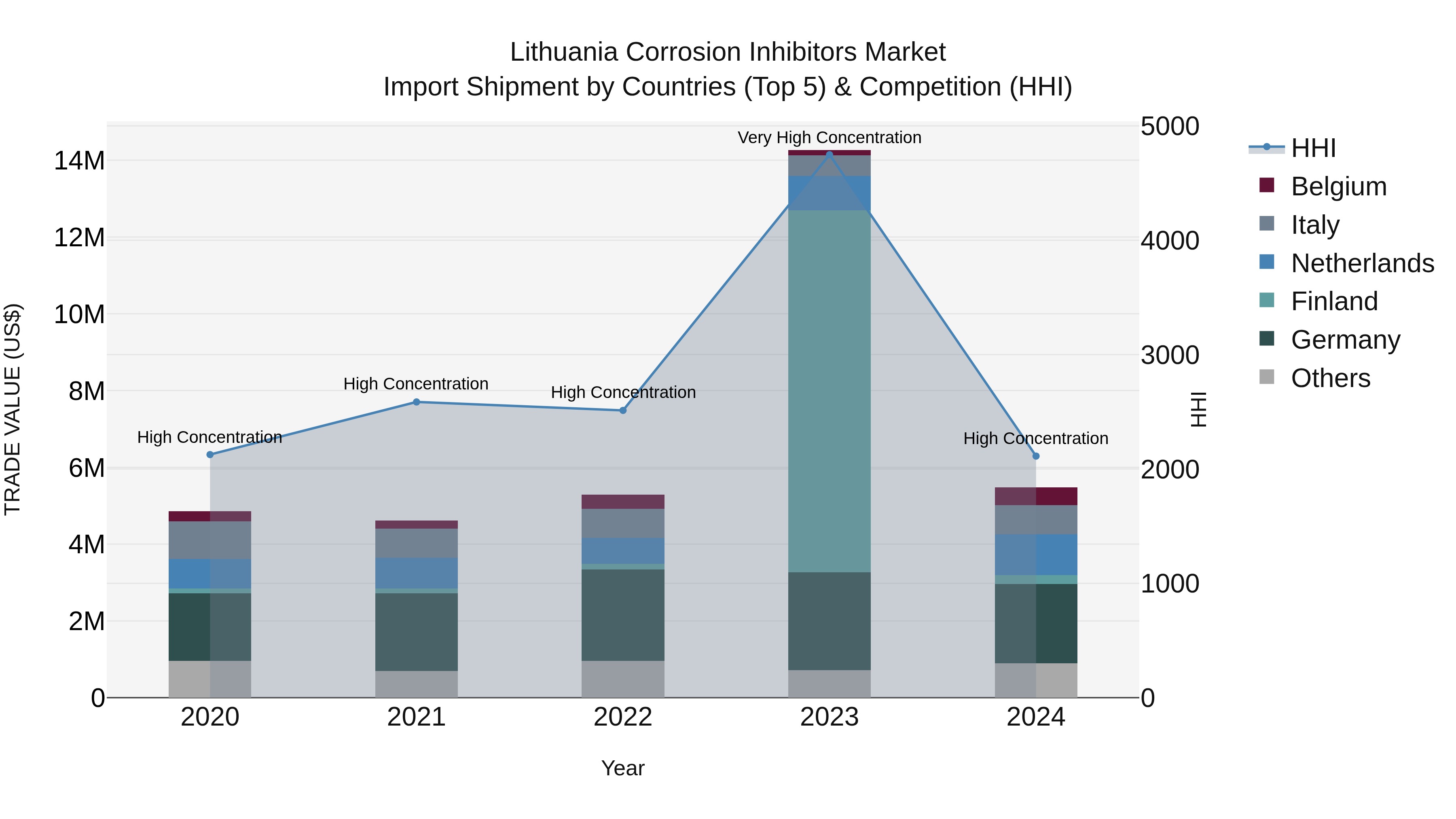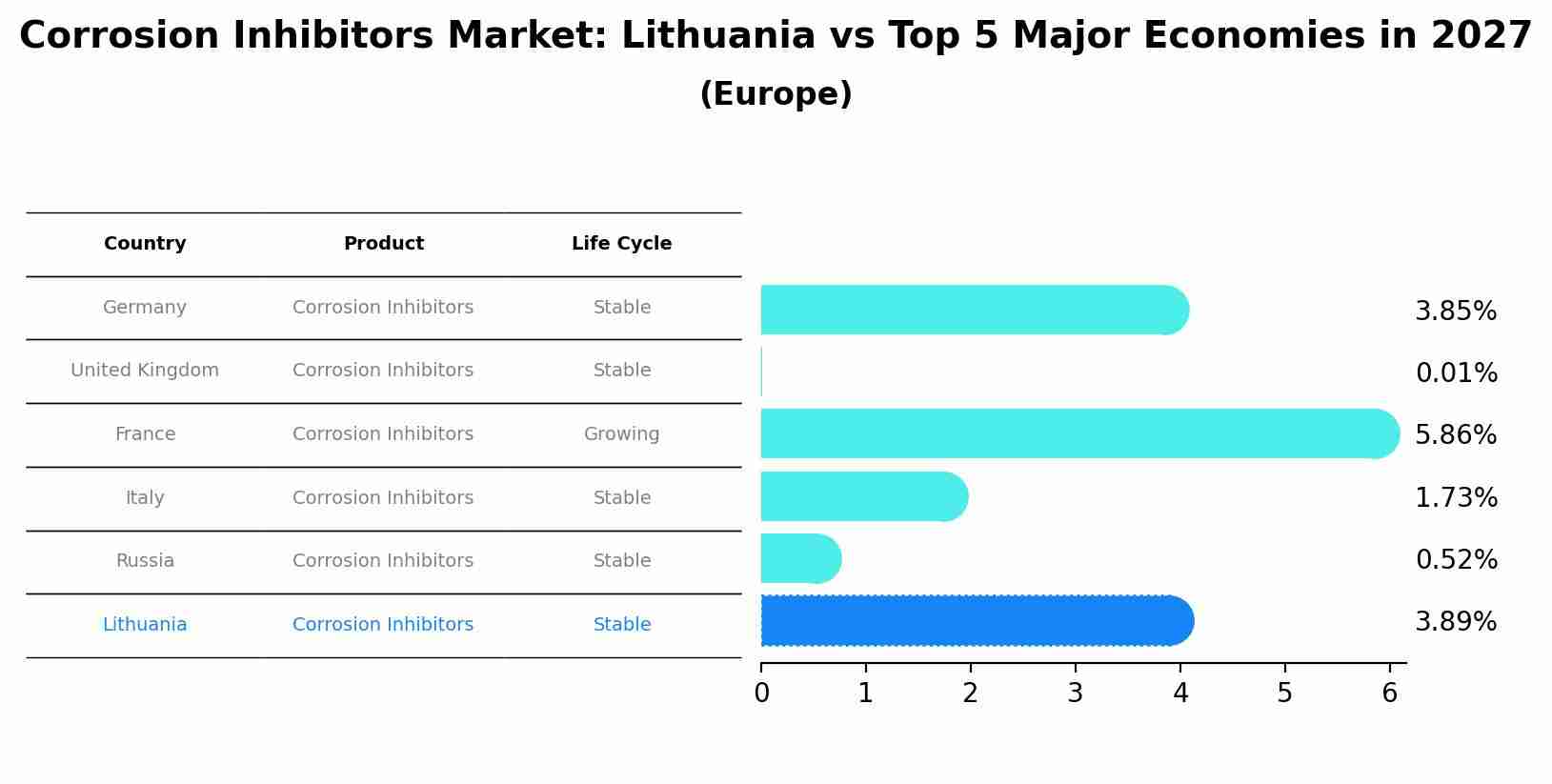Lithuania Corrosion Inhibitors Market (2025-2031) | Forecast, Revenue, Segmentation, Analysis, Industry, Outlook, Growth, Share, Companies, Size, Trends & Value
| Product Code: ETC4665965 | Publication Date: Nov 2023 | Updated Date: Nov 2025 | Product Type: Market Research Report | |
| Publisher: 6Wresearch | Author: Shubham Padhi | No. of Pages: 60 | No. of Figures: 30 | No. of Tables: 5 |
Lithuania Corrosion Inhibitors Market Top 5 Importing Countries and Market Competition (HHI) Analysis
The Lithuania corrosion inhibitors import market saw a significant shift in 2024, with top exporting countries being Germany, Netherlands, Italy, Belgium, and Belarus. Despite a decrease in growth rate from 2023 to 2024, the market continues to show a steady CAGR of 3.06% from 2020 to 2024. The high concentration of the Herfindahl-Hirschman Index (HHI) in 2023 persisted into 2024, indicating a competitive market landscape. As Lithuania`s demand for corrosion inhibitors remains strong, market players should closely monitor changing trends and competition dynamics to capitalize on emerging opportunities.

Corrosion Inhibitors Market: Lithuania vs Top 5 Major Economies in 2027 (Europe)
The Corrosion Inhibitors market in Lithuania is projected to grow at a stable growth rate of 3.89% by 2027, highlighting the country's increasing focus on advanced technologies within the Europe region, where Germany holds the dominant position, followed closely by United Kingdom, France, Italy and Russia, shaping overall regional demand.

Key Highlights of the Report:
- Lithuania Corrosion Inhibitors Market Outlook
- Market Size of Lithuania Corrosion Inhibitors Market, 2024
- Forecast of Lithuania Corrosion Inhibitors Market, 2031
- Historical Data and Forecast of Lithuania Corrosion Inhibitors Revenues & Volume for the Period 2021-2031
- Lithuania Corrosion Inhibitors Market Trend Evolution
- Lithuania Corrosion Inhibitors Market Drivers and Challenges
- Lithuania Corrosion Inhibitors Price Trends
- Lithuania Corrosion Inhibitors Porter`s Five Forces
- Lithuania Corrosion Inhibitors Industry Life Cycle
- Historical Data and Forecast of Lithuania Corrosion Inhibitors Market Revenues & Volume By Product for the Period 2021-2031
- Historical Data and Forecast of Lithuania Corrosion Inhibitors Market Revenues & Volume By Organic for the Period 2021-2031
- Historical Data and Forecast of Lithuania Corrosion Inhibitors Market Revenues & Volume By Inorganic for the Period 2021-2031
- Historical Data and Forecast of Lithuania Corrosion Inhibitors Market Revenues & Volume By Type for the Period 2021-2031
- Historical Data and Forecast of Lithuania Corrosion Inhibitors Market Revenues & Volume By Water Based for the Period 2021-2031
- Historical Data and Forecast of Lithuania Corrosion Inhibitors Market Revenues & Volume By Oil Based for the Period 2021-2031
- Historical Data and Forecast of Lithuania Corrosion Inhibitors Market Revenues & Volume By End-use for the Period 2021-2031
- Historical Data and Forecast of Lithuania Corrosion Inhibitors Market Revenues & Volume By Power Generation for the Period 2021-2031
- Historical Data and Forecast of Lithuania Corrosion Inhibitors Market Revenues & Volume By Oil & Gas for the Period 2021-2031
- Historical Data and Forecast of Lithuania Corrosion Inhibitors Market Revenues & Volume By Paper & Pulp for the Period 2021-2031
- Historical Data and Forecast of Lithuania Corrosion Inhibitors Market Revenues & Volume By Metal Processing for the Period 2021-2031
- Historical Data and Forecast of Lithuania Corrosion Inhibitors Market Revenues & Volume By Chemical Processing for the Period 2021-2031
- Historical Data and Forecast of Lithuania Corrosion Inhibitors Market Revenues & Volume By Water Treatment for the Period 2021-2031
- Historical Data and Forecast of Lithuania Corrosion Inhibitors Market Revenues & Volume By Others for the Period 2021-2031
- Lithuania Corrosion Inhibitors Import Export Trade Statistics
- Market Opportunity Assessment By Product
- Market Opportunity Assessment By Type
- Market Opportunity Assessment By End-use
- Lithuania Corrosion Inhibitors Top Companies Market Share
- Lithuania Corrosion Inhibitors Competitive Benchmarking By Technical and Operational Parameters
- Lithuania Corrosion Inhibitors Company Profiles
- Lithuania Corrosion Inhibitors Key Strategic Recommendations
Frequently Asked Questions About the Market Study (FAQs):
1 Executive Summary |
2 Introduction |
2.1 Key Highlights of the Report |
2.2 Report Description |
2.3 Market Scope & Segmentation |
2.4 Research Methodology |
2.5 Assumptions |
3 Lithuania Corrosion Inhibitors Market Overview |
3.1 Lithuania Country Macro Economic Indicators |
3.2 Lithuania Corrosion Inhibitors Market Revenues & Volume, 2021 & 2031F |
3.3 Lithuania Corrosion Inhibitors Market - Industry Life Cycle |
3.4 Lithuania Corrosion Inhibitors Market - Porter's Five Forces |
3.5 Lithuania Corrosion Inhibitors Market Revenues & Volume Share, By Product, 2021 & 2031F |
3.6 Lithuania Corrosion Inhibitors Market Revenues & Volume Share, By Type, 2021 & 2031F |
3.7 Lithuania Corrosion Inhibitors Market Revenues & Volume Share, By End-use, 2021 & 2031F |
4 Lithuania Corrosion Inhibitors Market Dynamics |
4.1 Impact Analysis |
4.2 Market Drivers |
4.3 Market Restraints |
5 Lithuania Corrosion Inhibitors Market Trends |
6 Lithuania Corrosion Inhibitors Market Segmentations |
6.1 Lithuania Corrosion Inhibitors Market, By Product |
6.1.1 Overview and Analysis |
6.1.2 Lithuania Corrosion Inhibitors Market Revenues & Volume, By Organic, 2021-2031F |
6.1.3 Lithuania Corrosion Inhibitors Market Revenues & Volume, By Inorganic, 2021-2031F |
6.2 Lithuania Corrosion Inhibitors Market, By Type |
6.2.1 Overview and Analysis |
6.2.2 Lithuania Corrosion Inhibitors Market Revenues & Volume, By Water Based, 2021-2031F |
6.2.3 Lithuania Corrosion Inhibitors Market Revenues & Volume, By Oil Based, 2021-2031F |
6.3 Lithuania Corrosion Inhibitors Market, By End-use |
6.3.1 Overview and Analysis |
6.3.2 Lithuania Corrosion Inhibitors Market Revenues & Volume, By Power Generation, 2021-2031F |
6.3.3 Lithuania Corrosion Inhibitors Market Revenues & Volume, By Oil & Gas, 2021-2031F |
6.3.4 Lithuania Corrosion Inhibitors Market Revenues & Volume, By Paper & Pulp, 2021-2031F |
6.3.5 Lithuania Corrosion Inhibitors Market Revenues & Volume, By Metal Processing, 2021-2031F |
6.3.6 Lithuania Corrosion Inhibitors Market Revenues & Volume, By Chemical Processing, 2021-2031F |
6.3.7 Lithuania Corrosion Inhibitors Market Revenues & Volume, By Water Treatment, 2021-2031F |
7 Lithuania Corrosion Inhibitors Market Import-Export Trade Statistics |
7.1 Lithuania Corrosion Inhibitors Market Export to Major Countries |
7.2 Lithuania Corrosion Inhibitors Market Imports from Major Countries |
8 Lithuania Corrosion Inhibitors Market Key Performance Indicators |
9 Lithuania Corrosion Inhibitors Market - Opportunity Assessment |
9.1 Lithuania Corrosion Inhibitors Market Opportunity Assessment, By Product, 2021 & 2031F |
9.2 Lithuania Corrosion Inhibitors Market Opportunity Assessment, By Type, 2021 & 2031F |
9.3 Lithuania Corrosion Inhibitors Market Opportunity Assessment, By End-use, 2021 & 2031F |
10 Lithuania Corrosion Inhibitors Market - Competitive Landscape |
10.1 Lithuania Corrosion Inhibitors Market Revenue Share, By Companies, 2024 |
10.2 Lithuania Corrosion Inhibitors Market Competitive Benchmarking, By Operating and Technical Parameters |
11 Company Profiles |
12 Recommendations | 13 Disclaimer |
- Single User License$ 1,995
- Department License$ 2,400
- Site License$ 3,120
- Global License$ 3,795
Search
Thought Leadership and Analyst Meet
Our Clients
Related Reports
- Afghanistan Apparel Market (2026-2032) | Growth, Outlook, Industry, Segmentation, Forecast, Size, Companies, Trends, Value, Share, Analysis & Revenue
- Canada Oil and Gas Market (2026-2032) | Share, Segmentation, Value, Industry, Trends, Forecast, Analysis, Size & Revenue, Growth, Competitive Landscape, Outlook, Companies
- Germany Breakfast Food Market (2026-2032) | Industry, Share, Growth, Size, Companies, Value, Analysis, Revenue, Trends, Forecast & Outlook
- Australia Briquette Market (2025-2031) | Growth, Size, Revenue, Forecast, Analysis, Trends, Value, Share, Industry & Companies
- Vietnam System Integrator Market (2025-2031) | Size, Companies, Analysis, Industry, Value, Forecast, Growth, Trends, Revenue & Share
- ASEAN and Thailand Brain Health Supplements Market (2025-2031) | Strategy, Consumer Insights, Analysis, Investment Trends, Opportunities, Growth, Size, Share, Industry, Revenue, Segments, Value, Segmentation, Supply, Forecast, Restraints, Outlook, Competition, Drivers, Trends, Demand, Pricing Analysis, Competitive, Strategic Insights, Companies, Challenges
- ASEAN Bearings Market (2025-2031) | Strategy, Consumer Insights, Analysis, Investment Trends, Opportunities, Growth, Size, Share, Industry, Revenue, Segments, Value, Segmentation, Supply, Forecast, Restraints, Outlook, Competition, Drivers, Trends, Demand, Pricing Analysis, Competitive, Strategic Insights, Companies, Challenges
- Europe Flooring Market (2025-2031) | Outlook, Share, Industry, Trends, Forecast, Companies, Revenue, Size, Analysis, Growth & Value
- Saudi Arabia Manlift Market (2025-2031) | Outlook, Size, Growth, Trends, Companies, Industry, Revenue, Value, Share, Forecast & Analysis
- Uganda Excavator, Crane, and Wheel Loaders Market (2025-2031) | Strategy, Consumer Insights, Analysis, Investment Trends, Opportunities, Growth, Size, Share, Industry, Revenue, Segments, Value, Segmentation, Supply, Forecast, Restraints, Outlook, Competition, Drivers, Trends, Demand, Pricing Analysis, Competitive, Strategic Insights, Companies, Challenges
Industry Events and Analyst Meet
Whitepaper
- Middle East & Africa Commercial Security Market Click here to view more.
- Middle East & Africa Fire Safety Systems & Equipment Market Click here to view more.
- GCC Drone Market Click here to view more.
- Middle East Lighting Fixture Market Click here to view more.
- GCC Physical & Perimeter Security Market Click here to view more.
6WResearch In News
- Doha a strategic location for EV manufacturing hub: IPA Qatar
- Demand for luxury TVs surging in the GCC, says Samsung
- Empowering Growth: The Thriving Journey of Bangladesh’s Cable Industry
- Demand for luxury TVs surging in the GCC, says Samsung
- Video call with a traditional healer? Once unthinkable, it’s now common in South Africa
- Intelligent Buildings To Smooth GCC’s Path To Net Zero


















